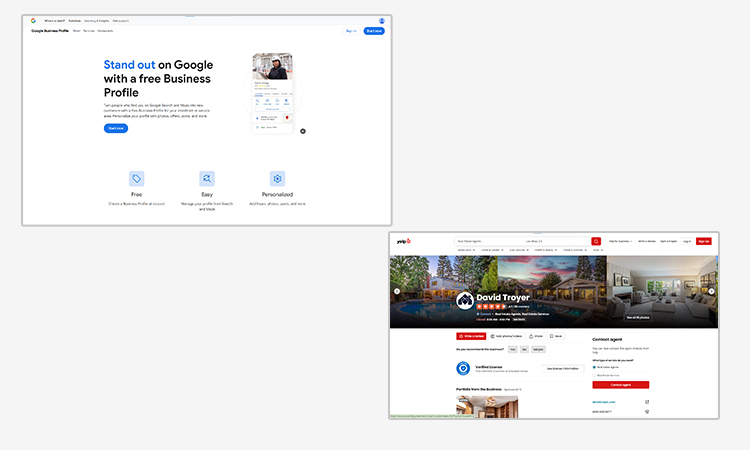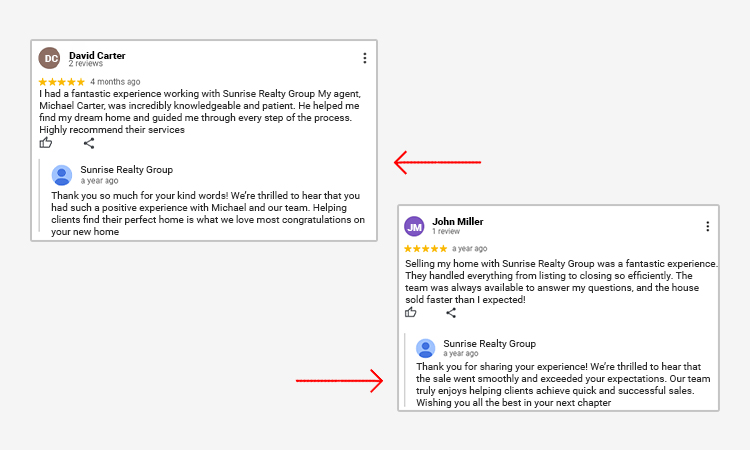In the real estate industry, a realtor’s reputation is what can make or break a deal. While ignoring a negative review can cost you a client, not prioritizing your online brand reputation can cost you your entire real estate business. Always remember – trust is the currency in today’s highly competitive digital landscape. If you have a realtor, whether you own a start-up or are an old player in the market, you must prioritize online reputation management for real estate.
According to a 2025 study by AI Home Design, 43%-47% of homebuyers searched online consistently as the initial step in the home search process between 2020-2024. If your real estate business doesn’t show up for these online searches, you’re in trouble!
As a realtor, your local market is all about referrals. Effective reputation strategies help you build authority, making you win more deals and referrals. So, what’s the secret to gaining a competitive edge in the real estate market and gaining client trust?
Let’s explore more about effective real estate reputation management – why it matters, challenges, strategies that can take your business to new heights, and more.
What is Reputation Management for Real Estate?
It refers to the process of managing what clients perceive about a real estate business. Real estate reputation management requires realtors to follow a strategic approach to influence the public perception about their business.
It’s an ongoing process; every realtor should prioritize investing in this to grow a loyal online client base and achieve long-term success.
Building a noteworthy digital reputation is not just damage control; it’s about establishing a solid online image in advance, so that it can protect your business when any damage happens.
For a real estate business, success depends not only on the professional’s market knowledge and negotiation skills. It also depends on the trust the realtor has built so far with his/her clients.
What does it involve? From client review management and personal branding to claiming local business listings, real estate reputation management covers every aspect and beyond. These practices significantly transform the way online users perceive a specific real estate business.
And, the primary goal?
The aim is to protect the digital image of real estate agents, businesses, firms, and service providers during reputational crises. With the right online reputation management strategies for realtors, you can attract new clients, crack new deals, and grow your client base. Now, let’s know about the other reasons why reputation management matters for real estate business.
Why Reputation Management Matters in Real Estate: 6 Key Reasons
In the real estate industry, a realtor’s reputation is everything. Nowadays, a majority of property buyers find real estate agents by searching online.
Do you know that 37% of property buyers find real estate agents by searching online? Among them –
- 23% find agents through a real estate website or app
- 7% through social media platforms
- 7% through search engines
These statistics show how important it is for real estate agents to build a prominent reputation across online platforms. Let’s have a look at the 6 major reasons why online reputation management is crucial in real estate.
- Builds Client Trust and Business Credibility
Imagine buying or selling a house or investing in a property without researching much. You’ll be more likely to regret it later. Buying or selling a home is one of the most important financial decisions of someone’s life.
The buyer or seller must feel confident that they’re choosing a reliable real estate agent. ORM for real estate requires realtors to showcase positive reviews and glowing client testimonials and client testimonials, which serve as social proof. The more clients come across these reviews, the more they trust a real estate business.
- Increases Word-of-Mouth Referrals and Recommendations
As we already said, the likelihood of getting more deals and acquiring new clients significantly depends on referrals for real estate businesses. Effective ORM practices require you to encourage your satisfied clients to share their positive experience with others, which leads to word-of-mouth referrals.
It shows that many buyers and sellers, along with property managers, have already tried a business and received satisfactory services, which naturally encourages potential clients to consider a specific realtor for their real estate needs.
So, your happy clients become the brand ambassadors of your real estate business who advocate the benefits of hiring your services.
- Improves Online Visibility and Market Reach
As a significant strategy for reputation management for real estate, a realtor needs to improve their business’s online presence. Search engines like Google prefer local businesses with a great digital presence, a well-optimized GBP profile, and positive reviews to rank higher in their results.
This significantly improves the online search visibility of a real estate business. Similarly, it makes your real estate business more visible to those potential clients who are searching for reliable real estate services in your service area.
- Helps to Stand Out from Competitors
This works quite simply!
If you build a solid reputation online for your real estate business, it will be more visible across digital platforms than those businesses with a poor reputation. Today’s real estate market is highly competitive and crowded with top ORM leaders.
A positive digital image sets your real estate business apart from other available service providers. It positions your business as a preferred ORM resource in the market by highlighting your USPs, commitment, business values, and expertise.
- Drives Sales and Conversions
The better reputation your real estate business holds, the more chances to acquire new clients and get more deals. Reputation management ensures building and monitoring an exceptional public image that will indirectly promote your real estate services.
Even for potential clients who have searched for your brand name online can get impressed by what they see about you online. This can result in conversions – client trust and business credibility can directly transform into inquiries and closed deals.
- Leaves a Positive First Impression Online
A vast majority of potential clients who are actively searching for sellers or real estate agents are more likely to perform online searches regularly. The information available online about your business is what these prospects will interact with at first.
This is what will leave the first impression on these potential clients. Effective reputation management ensures what your prospects will find – professional photos, glowing reviews, and a noteworthy digital presence.
If you have built a robust online reputation for your real estate business, you can seamlessly leave a positive first impression on your prospective clients.
Common Reputation Challenges in Real Estate
Just as any other online marketing technique, reputation management also comes with several challenges. Building a strong online reputation is not a cakewalk!
Realtors can face several challenges while managing their business reputation. Here we’ve talked about the 4 most common reputation challenges for the real estate business. Identifying these challenges can help you prevent extreme reputational damage in advance.
- Fake or Malicious Reviews
Your competitors or unhappy employees may leave fake reviews to damage your business reputation. Identifying fake reviews accurately requires proper observation skills and knowledge. You may face a hard time distinguishing fake reviews from the real ones. Additionally, fake reviews can also adversely impact your brand reputation.
- Negative Feedback from Unsatisfied Clients
Real estate transactions are mostly stressful for people, as they involve a huge financial investment. It is more likely for them to leave negative reviews if they feel ignored or misunderstood by the real estate agents. Many realtors make the common mistake of ignoring customer feedback and not responding to it promptly. This can lead to a communication gap between an agent and their clients.
- Inconsistent Listings or Outdated Information across Platforms
Sometimes, realtors ignore optimizing their local business listings. They provide inconsistent and inaccurate information that results in confusion among their clients. If your prospects come across misleading information like listings of properties already sold and incorrect square footage, they may not rely on your expertise and are more likely to question your credibility.
- Social Media Missteps or Local Press Coverage Issues
If you lack a proper strategy, you may post irrelevant content on social media, focusing on quantity. Maintaining a social media presence requires time and effort. Inconsistent posting on social media can make your real estate business appear inactive. Furthermore, reputational crises like negative press can spread like wildfire and severely harm your brand reputation.
How to Build and Manage a Positive Online Reputation for Your Real Estate Business?
Now you must have an idea why positive reputation building is crucial for real estate businesses. But, if you’re wondering how you can build and manage a positive online image of your real estate brand, here is a complete guide for you.
Step 1: Audit Your Real Estate Business’s Current Reputation

The first step to start with reputation management for real estate is to audit your business’s existing reputation.
What is reputation auditing? Reputation auditing is examining where a brand’s existing image stands. It’s about assessing how a brand is being perceived by the public across all online and offline platforms.
Without having a clear idea of your real estate reputation, you cannot personalize your ORM strategies to meet your desired goals. Here’s how you can audit your real estate brand’s online reputation.
- Search for Your Business Name on Google
The easiest way to know how your real estate brand appears online for relevant searches is to Google your brand name. Perform a basic Google search, as Google accounts for nearly 89.66% of the global search engine market.
Your potential customers will Google your brand name – it’s important to see what appears on Google about your real estate business.
What to search?
- Your real estate business name
- Your name as a realtor
- Related keywords like ‘your name as a realtor in (your service area name)’ or ‘top real estate company in your service area’
Tips to Perform an Effective Google Search for Your Real Estate Brand
- Always use an incognito window to prevent your search history from influencing the results, and get a more accurate view of what normal consumers see online.
- Carefully review the first few pages, as most users don’t visit past the first page.
- Check the Google images and find if there are any outdated or reputationally damaging photos.
- Track Your Reviews on Listings, such as Google Business Profile, Realtor.com, Facebook, and Yelp
To check your reviews across various online platforms, you need to track Google Business Profile, Realtor.com, Yelp, and social media channels. Reviews on these major sites will help you get a clear idea of how your clients are perceiving your real estate services.
Focus on sites like –
- Google Business Profile (GBP) – It’s a free tool from Google, ideal for local marketing for real estate businesses, enhancing their visibility in Google Maps and Google Search.
- Realtor.com – This is a digital real estate marketplace that offers comprehensive insights regarding property listings, reviews, and tools to connect real estate agents with buyers and sellers.
- Zillow – This is a platform where real estate professionals can list properties and use its advertising programs (e.g., Premier Agent) to generate qualified leads.
- Yelp – It’s a review-focused directory that allows real estate businesses to build their digital image and attract local clients who are actively looking for real estate services.
- Facebook – It’s a widely used social media platform with a broader reach, allowing real estate businesses to engage with their community, market properties, and leverage client reviews.
- Identify Outdated or Inaccurate Information
It’s important to check whether your online business listings have inaccurate and inconsistent details. Real estate agents must ensure all their listings have the same details, including contact information, service areas, website URLs, and the like. Outdated and inconsistent NAP details can create confusion among your potential clients.
Another thing to check is whether you have accurately claimed ownership of your real estate business.
Some Tools to Audit Your Real Estate Business’s Online Reputation
- Google Alerts – This free tool can help you get real-time alerts whenever you receive any new reviews or mentions across online platforms.
- Mention – This one helps in tracking brand mentions on social media platforms and the users’ sentiment about your real estate brand.
- Meltwater – This tool can be used for online media monitoring and PR.
- Brandwatch – It’s a comprehensive tool for social media sentiment tracking, social listening, and competitive benchmarking.
- ReviewTrackers – With this tool, real estate professionals can track their online reviews from various online platforms.
Step 2: Claim Your Local Business Listings

We hope that you have now properly noted the inaccuracies in your business listings’ details. Claiming your business listings
Local Directories to Prioritize
Here are some top local online directories that real estate businesses must prioritize.
- Google Business Profile (GBP)
It’s a free tool from Google that you can use to manage your real estate business’s online presence – in simple terms, how your real estate business is looking online and what information is appearing in the search results page when someone searches for your brand name. Check this most important digital storefront to ensure all your NAP information is accurate and that you have Google reviews as well.
- Realtor.com
This is one of the most popular industry-specific comprehensive review sites, offering extensive listings of homes for sale and rent. Positive reviews on this site will improve your brand reputation as a realtor.
- Zillow
This is another industry-specific review site and online real estate marketplace that provides details and services for selling, buying, and renting homes through the website and mobile app. Zillow reviews are crucial for real estate agents.
- Yelp
It’s a resource for consumers to find real estate agents in their nearby location. They can even read the Yelp reviews and choose the best service providers. Even satisfied clients can share their experience of partnering with a realtor who can build a strong reputation for your real estate brands. Realtors must prioritize implementing effective Yelp review management strategies to grow their digital image.
One of the most popular social media platforms with a wide audience reach, approximately 3.07 billion monthly users. This is ideal for market listings and generating leads with the potential to convert into loyal, paying clients. Reviews on your Facebook Business Page will serve as your real estate business’s advocate.
How to Claim Your Business Listings?
Visit the official website of the local directory (e.g., Yelp, Zillow, or Google Business Profile) > search for your real estate business’s name or your name as a realtor > find your business and click on the ‘claim the business’ or ‘own this business’ button (the button varies from platform ot platform, click on the similar named button) > verify your business through methods like phone call, email, SMS, or postcard.
4 Best Strategies to Optimize Your Real Estate Business Listings
Effectively claiming and optimizing various business listings is crucial in online reputation management for real estate companies. Here are four helpful key strategies to optimize your business listings.
- Include Your Business’s NAP Details and Ensure Consistency
NAP stands for your real estate company’s name, address, and phone number. Ensure these details are accurately updated and consistent across all your business listings. Apart from these, you need to update your business’s –
- Hours of operation
- Property listings
- Photos and images of your projects
- Website URL
- Social media handles
- Awards, certifications, and business descriptions
- Add High-quality Photos and Videos
For real estate businesses, visuals play a huge role in allowing prospective clients to preview properties and choose a suitable company or agent based on their previous projects.
- Invest in a professional photographer or videographer to shoot high-quality images and videos of your property listings.
- Make sure to keep your properties clean, decluttered, and bright enough before shooting any video.
- Focus on the unique selling points (USPs) of your properties, including their architectural details, upgraded kitchens, and landscaping.
For videos, you can create engaging visuals like –
- Virtual Tours – You can create videos to offer interactive 3D tours and guided video walkthroughs to help remote property buyers virtually experience the space.
- Agent Profile Videos – This is a type of short professional video that you can create to introduce your business or yourself as a realtor, your philosophy, and expertise.
- Neighborhood Spotlights – Realtors must develop videos to showcase local amenities, schools, parks, and the community.
- Branding Visuals – You can use professional headshots and consistent branding images across the platforms, like your official website, review sites, and social media platforms.
- Write Professional Bios and Compelling Business Descriptions
This professional bio and compelling business description are opportunities to tell the story of your real estate business and establish your brand expertise.
Some tips for you –
- Do you only list your work experience as a realtor? Don’t do it; rather, you must try to explain how your expertise and proven experience can benefit the clients.
- Share a brief detail of your personality to make yourself more relatable.
- Use the key metrics of your financial growth and overall business growth from previous years
- Incorporate a call to action (CTA) at the end of the bio (e.g., ‘Contact Us for a Consultation’)
For the description:
- Define your niche: You need to know what makes your real estate business unique from your market competitors.
- Mention your specialization: If your real estate business specializes in luxury properties, you can mention the same in your business listings.
- Prioritize client experience: As a real estate business owner, you can emphasize communication or maintain transparency through extraordinary services.
- Leverage storytelling: Real estate business owners can describe their brand mission and origin story to connect more with people through narratives.
- Mention your coverage area: You must clearly state the geographic locations where you serve real estate services.
- Highlight Your Awards, Certifications, and Community Involvement
This part is to demonstrate your credentials, achievements, and community spirit to establish authority and client trust. You can mention your ‘Awards and Recognition’ in the business listings. However, don’t forget to display the logos of your real estate brand that you own, or any other certifications like ‘Certified Luxury Home Marketing Specialist’.
Don’t forget to showcase your community involvement –
- If you have partnered with local charities or sponsored events as a real estate agent
- Mention the outcome of an event instead of mentioning just that you have sponsored an event
- Use photos to share references with your potential clients; share images of your team participating in volunteer efforts
Step 3: Manage Client Reviews like a Pro

Reviews play a huge part in reputation management for real estate as they serve as social proof and word-of-mouth recommendations. Real estate businesses must know how to manage customer feedback like an expert. Once you know the secrets of actively managing your client reviews like an expert, you can ace the reputation game for your real estate practice.
Here, we’ve talked about how a real estate business owner can handle their online client reviews with a strategic approach.
- Generate More Reviews from New Clients Post-Completion of a Project
Completed a project? Delivered an expensive property? Get a fully-furnished home sold?
Now it’s time to generate positive reviews from your satisfied clients. If you’re thinking that the happy clients will share their positive feedback without even being asked for once. You’re highly mistaken!
You must encourage your clients to share their genuine feedback on partnering with your real estate business. Here’s how you can do it like a pro.
- Offer exceptional services – This is the foundation that determines how many positive reviews your real estate business will receive. If your clients are genuinely satisfied, they will be more likely to leave positive reviews.
- Ask at the right time – The best time to ask for reviews is when the service experience is still fresh in your clients’ minds. You can ask for reviews after a successful completion of a project, a smooth move-in to a property, and a tough negotiation.
- Make the process easy – Make the process of submitting a review easier for your clients, even the clients who’re not tech-savvy can seamlessly share a review. Provide the link to your preferred review page on GBP, Yelp, Zillow, or Realtor.com to guide your clients where to share their feedback.
- Tailor your review request – Address the clients by their name while requesting them to share their feedback. Apart from this, a personalized review request can include a thank-you note for seeking the real estate services.
- Explain why a review matters to you – Don’t forget to mention why client reviews matter to you the most. Mentioning the importance of the review request will help your clients make informed decisions. They will be more likely to help if they understand the benefits you’ll get through a review.
- Guide the clients – Though it’s surprising, many clients don’t know how to submit a review. You can attach simple guidelines with your review requests to provide proper prompts.
- Follow up regularly – Your clients are mostly busy; if you don’t follow up with them with a gentle reminder through email or SMS, they may not remember to leave a review.
- Automate the process – Busy enough to send review requests to each person? Or lack an in-house ORM team? We suggest you automate the process of sending review requests. So whenever you complete a real estate project, your in-house CRM system automatically sends a review request to the respective clients.
- Promptly and Professionally Respond to Reviews
Professional online review management services include sending prompt and professional responses to your online reviews.
Let’s check out how you can professionally respond to your real estate client reviews.
- Respond swiftly: Try to respond to a review within 24-48 hours of receiving it to show that you’re engaged and truly value your clients’ opinions.
- Express your gratitude: Thank your clients for sharing their genuine experience of partnering with your real estate brand and seeking services. Acknowledge the time they have taken to share their feedback.
- Mention specific details: If any service or team member gets highlighted by your clients in their reviews, try to discuss it in your response. It will show that you’ve thoroughly read the reviews.
- Personalize your response: You can use the client’s name and specific positive points in your response. It will show that you’re not using a generic template and have written a response to address the specific client.
- Create templates: You can create personalized and unique templates for different review responses for the clients. Avoid using the same responses for every review you receive.
- Encourage future businesses: Real estate agents must invite the existing clients to reach out to them again for future real estate needs. It’s a must to encourage future businesses through your review responses.
- Handle Negative and Fake Reviews
It’s quite normal to receive negative client feedback along with positive reviews. You cannot expect all your clients to have a positive experience with your real estate business. Negative reviews are common and demand a prompt response from your end.
According to a MackCollier study, 18% of customers become loyal clients after receiving a response to their negative reviews from the business.
So negative reviews are your opportunities to regain the trust of a client who is not satisfied with the services they have received from your real estate business.
- Acknowledge the feedback publicly to keep things transparent.
- You can request the reviewers to contact you personally for further discussion. Always remember, it’s better to deal with it in private rather than arguing with your clients on a public platform.
- We suggest you invite the clients to discuss specific transaction details offline, especially to respect their privacy.
- Showcase your empathy while responding to negative reviews and avoid using defensive and abusive language.
- In your response, show that you’ve heard their concern and walk an extra mile to resolve their issue.
- If things go out of control, it’s best to take the conversation offline.
- Don’t forget to keep them informed about the steps you’re taking to offer them the best possible solution.
As a real estate business owner, it’s common for you to receive fake online reviews. Ignoring those reviews can actually damage your reputation and showcase your business in a negative light. Here’s how you can handle fake online reviews.
- Avoid ignoring those fake reviews; it’s essential to respond to them professionally.
- You shouldn’t mistakenly identify a negative review as a fake one. A negative review doesn’t need to be fraudulent feedback.
- Detect the patterns like repetitive words, poor vocabulary and grammar, reviewer’s profile with previous record and image, abusive language, emotional content, too much promotion for competitor’s services, irrelevant content, and the like.
- Once you detect it, you can respond to them like this –
“Hey (reviewer’s name), thank you for informing us of your concerns. However, we would like to inform you that our team has checked the record of your mentioned service booking date and found no data, unfortunately. We have no client with your name. If you have any reference, like your service booking details and receipts, kindly send us at (email ID). We will be happy to discuss your issue personally and resolve your concern.”
- If the fake review can be damaging to your real estate, you can also consider reporting it by following the steps –
Find the review on the respective online site > click on the three dots in the right-upper corner of the review > click on ‘Report’ or ‘Flag as inappropriate’ > choose a reason why you want to report that specific review > submit your report
- Promote Client Testimonials on Website and Social Media Profiles
Once you receive glowing reviews and appreciations from your satisfied real estate clients, the next step is to showcase them like a trophy. From your website to your social media profiles, those reviews must be promoted in the best possible way.
Why? They can help you attract more leads for your business.
- Create a dedicated page – You can create a separate page on your website, like ‘What our happy customers say’ or ‘Our client testimonials’
- Embed social media reviews – Use plugins to display your social media reviews on your official website.
- Add a call to action (CTA) button – Another alternative way is to incorporate a CTA on your site, like ‘Our Client Testimonials’ or ‘Tap to Check Our Ratings’. By clicking on it, your visitors can see your online reviews.
- Create graphics – Use specialized tools like Canva to create visually attractive graphics with customer glowing reviews to post them on your social media profiles.
- Share stories – For Instagram, you can post reviews on your Stories to increase their visibility.
Step 4: Consider Personal Branding for Real Estate Business

Personal branding is a crucial part of online reputation management for real estate businesses.
No matter how many glowing reviews you receive for your real estate business, you must prioritize personal branding to present your brand uniquely in a competitive marketplace. An effective personal branding plan can help real estate businesses stay ahead of their competitors.
The following are some significant ORM strategies for real estate companies.
- Define Your Business Foundation
Firstly, you need to understand the specific requirements of your target audience – the property buyers and sellers. Find the answers to these questions –
- What area of real estate does your business specialize in?
- Does it target luxury home buyers and sellers, first-time buyers, or commercial property sellers?
- What are the USPs of your real estate business? Is it local market expertise, excellent negotiation skills, or personalized services?
- What do you want to achieve with your real estate brand?
- Do you want to attract new leads, referrals, or achieve a specific reputation in the real estate market?
- Determine Your Unique Value Proposition
Now it’s time to identify the unique aspects of your real estate business – what sets your business and services apart from other real estate companies?
To identify your business’s unique value propositions, you must –
- Highlight your unique skills and work experience as a real estate professional.
- Mention what sets you apart from other agents – mention your industry knowledge, awards, certifications, local connections with authoritative real estate resources, negotiation skills, and more.
- Talk about how you’ll add value to your clients’ real estate needs and the benefits they will achieve by partnering with your real estate business.
- Develop a brand statement where you highlight the reasons that make your real estate business an ideal choice for your clients.
- Build a Consistent Visual Identity
To build a consistent and memorable visual identity for your real estate business, you need to follow the steps –
- Create a logo and branding guideline: Firstly, every real estate business needs to have their personal logo to help potential clients easily remember its brand. Ensure the logo is consistent across all the online platforms and marketing materials, such as your website, social media profiles, business cards, flyers and brochures, advertisements, and more. Use a color theme, font, and imagery that perfectly reflect your real estate brand value.
- Invest in professional photography and videography: If you have a good budget, you can invest in professional photography and videography. Hire a professional videographer who can capture and edit high-quality visuals to showcase your projects (e.g., properties) and brand credibility in a visually captivating way.
- Establish a consistent online presence: Ensure you have an official website with a user-friendly and attractive design. Apart from your own site, you must have profiles on popular social media platforms like Facebook, Instagram, and LinkedIn to maintain a consistent brand image.
- Build Long-term Relationships with Existing and Potential Clients
You can exceed your client’s expectations by offering them personalized attention. Your clients will be more satisfied if they receive special attention from you. From offering exceptional services to promoting testimonials on your site and social media profiles, you can showcase how much you value their opinions.
These actions are essential to build and manage customer relationships with your existing and previous clients. Apart from this, you must maintain regular communication with your clients through email follow-ups, updates, and newsletters.
Step 5: Deal with Real Estate Reputational Crisis

A crisis can occur at any time, even without any sign. Real estate business thrives on client trust and business credibility, as this is directly associated with massive financial investment. So, it’s common for real estate professionals to experience a reputation crisis.
What can they do to prevent the reputational damage? They can develop a crisis management plan in advance to act upon it when a crisis occurs. A reputational crisis can spread like wildfire and damage your real estate reputation.
Here is a personalized crisis management plan for real estate companies.
- Keep Your Calm and Avoid Emotional Replies – Hundreds of negative reviews are coming? An old news item has just gone viral online. Keep your cool while responding to such situations. Using abusive words or taking actions emotionally can cause more distress for you.
- Address Issues Publicly – A reputational crisis is a public issue that needs to be addressed on a public platform. When a crisis happens, people are curious to know what you’re doing to resolve the issue.
- Offer a Sincere Apology – If a mistake has happened from your end, it’s best to apologize sincerely to the client concerned. With just a little apology, you can get the opportunity to turn a negative customer experience into a chance to regain their trust.
- Publish More Positive Content – When you publish positive content online, it showcases your business authority in the market. Try to publish informative blogs, engaging social media posts, and promote user-generated content like client testimonials to gain the trust of your potential clients.
- Report Fake Reviews if the Allegations Aren’t True – We have already talked about how you can report fake reviews if you find them damaging to your online reputation. Follow the process mentioned and don’t take responsibility for mistakes that are not made from your end.
- Focus on Offering a Suitable Resolution – In spite of defending yourself, you can focus on delivering a suitable resolution to the clients at the earliest. Address the clients’ concerns to understand their requirements to tailor your resolution.
- Learn from Your Mistakes – A crisis management process will help you identify your mistakes. Try to learn from them and avoid repeating them in the future.
Step 6: Monitor Your Real Estate Reputation

The last step is to monitor your real estate business’s online image. With the right strategies, you can seamlessly build a robust reputation for your business.
But what’s next? What if a crisis happens? What if you receive negative reviews?
To prevent such situations, you need to monitor your reputation thoroughly to identify potential risks and maintain a positive image.
- Set Up Google Alerts for Reviews and Mentions
Google Alerts is a free tool to monitor new reviews and brand mentions across online sites. Apart from your name, you can also search for key terms related to your real estate brand across the web, such as –
- ‘Your name as a realtor’ real estate
- ‘Your brokerage name’
- ‘Your brand name’ reviews
- ‘Your name’ reviews
- Top real estate firms in ‘your service area’
Monitor these keywords regularly, either once a day, monthly, or once a week. You can get real-time notifications for these keywords and track how your brand name is getting mentioned online.
- Use Social Listening Tools
Apart from Google Alerts, there are some social listening tools that you can use to track your real estate business’s social media conversations. You can use some dedicated social listening tools –
| Tools | Purpose to Use |
| Mention | • Ideal for monitoring brand mentions across social media platforms • Provides real-time alerts |
| Brand24 | • Offers advanced AI analytics • Provides real-time alerts and detailed reporting insights |
Reputology | • Centralizes customer reviews from industry-specific sites • Provides multi-location support for users |
With these tools, you can consolidate reviews and comments from various online sources into one single dashboard. Real estate business owners must check social media platforms for new mentions, reviews, direct messages, and comments. This process is best to gauge the sentiment of social media users for your real estate brand.
- Track Key Performance Metrics (KPIs)
The following are some key performance indicators that you must track while monitoring the process of reputation management for real estate.
- Website Traffic – Track the number of visitors to your official website and their activities on it, along with page views and bounce rates.
- Online Ratings and Reviews – The client feedback you’ve received so far with online star ratings to identify how well your real estate services are being perceived online.
- Client Sentiment – You can use tools like Google Analytics to track how much traffic your social media posts are getting, the likes, shares, comments, and views. Beyond a star rating, these strategies help you identify the underlying emotions of your potential clients.
- Client Conversions and Retention Rates – You can also track how many social media posts have driven the prospect to your listings or contact forms. Track the number of leads that have turned into potential clients, how often your past clients use your real estate services, and refer them to others.
- Type and Volume of Positive Reviews – You must track the volume of positive reviews you’ve received from your happy clients, along with the number of successful transactions.
Top 5 Tools to Monitor the Online Reputation of Your Real Estate Business
Here are the top 5 most helpful reputation management tools you can use to monitor your real estate brand’s online reputation.
| Tools | Features The Tool Offers |
| Google Alerts | • Real-time alerts for new reviews and brand mentions across online platforms • A free tool from Google, ideal for real estate startups with limited ORM budget |
| Sprout Social | • Broad social media monitoring • Integrated analytics • Customer service tools |
| ReviewTrackers | • Seamless review generation and monitoring • Client sentiment analysis |
| Birdeye | • Consolidated inbox for easier review management • Automated review requests • Best of local and multi-location businesses |
| Mention | • Social media listening • Social media conversation and brand mention tracking |
FAQs
Ans. We understand that the competition is real in today’s real estate market. Staying ahead of your market competitors is not an easy job. But you can build and maintain a positive digital reputation for the long run by focusing on delivering the best possible services to your clients. Apart from this, you need to build a strong online presence and position your real estate business as a local expert in the industry can work in your favor.
Ans. You should not defend yourself too much while replying to negative reviews. Try to identify the reasons why you’re receiving the reviews. Once you find the reasons, it’s time to respond to the negative reviews professionally and calmly. If the reviews reflect true service experiences, you must address the concerns and offer a suitable resolution. If those reviews are fake, you must also address and report them by providing a proper reason.
Ans. Most reputation management company has an expert team of skilled online reputation management professionals. Those experts have prominent expertise and proven work experience in handling various critical projects for clients across industries. By hiring such an agency, you can get expert guidance regarding how you can build and manage a solid online reputation for your real estate business. The team will identify your reputational needs and tailor strategies for your real estate business..
Conclusion
The importance of reputation management is paramount in the real estate industry. Your real estate business is as good as the digital world shows to to be. This implies, if a business offers premium real estate services but doesn’t have a positive online reputation, it may not successfully acquire new clients.
Everything depends on how your real estate business appears online. To improve this presence and elevate your brand reputation, we’ve provided you with a complete guide to reputation management for real estate businesses.
We hope that, if you follow our proven strategies, it will help you establish a strong position in the real estate industry and thrive in the digital world as well. Still have doubts? It’s best to partner with a renowned online reputation management agency to seek their professional services.

